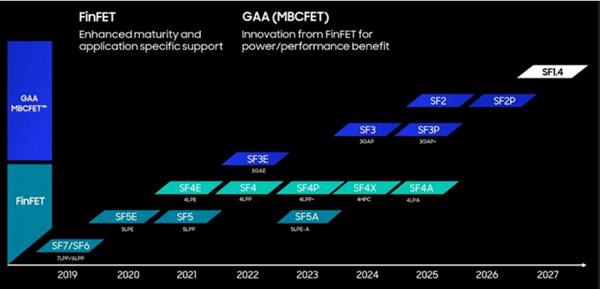Samsung shares 2nm1.4nm and 5nm RF plans

Samsung announced an updated manufacturing technology roadmap at the annual Samsung Foundry Forum 2023. The company is on track to produce chips at its 2nm and 1.4nm class nodes in 2025 and 2027, respectively. In addition, the company also plans to add a leading 5nm-class RF manufacturing process and start producing GaN chips in the next few years.
Compared with SF3 (2nd generation 3nm class) (at the same transistor count), Samsung expects its SF2 (2nm class) manufacturing technology to improve power efficiency by 25% (at the same frequency and transistor count) and improve performance by 12% % (at the same power and complexity), and reduce the area by 5% the company. The company will begin manufacturing mobile SoCs at the 2nm node in 2025, followed by the HPC-enhanced SF2P node in 2026. Meanwhile, the SF1.4 (1.4nm-class) manufacturing process is expected to be available to Samsung customers in 2027.
To make its SF2 node more competitive, Samsung intends to ensure that its customers will soon have access to a range of high-quality SF2 IP, including interfaces such as LPDDR5x, HBM3P, PCIe Gen6 and 112G SerDes.
In addition to providing leading technologies for smartphones, client PCs, and data center SoCs, Samsung also plans to offer specialized manufacturing processes in the coming years. These include SF2A tailored for automotive applications in 2027 and a 5nm radio frequency (RF) node in 2025. The upcoming 5nm RF is expected to improve power efficiency by 40% and increase transistor density by about 50% compared to the current generation 14nm RF process.
Samsung also plans to start producing gallium nitride (GaN) power semiconductors in 2025. The chips will target a variety of applications, from consumer electronics to data centers and the automotive industry.
Samsung Foundry is not only focused on expanding its technology portfolio, but also enhancing its manufacturing capabilities in the US and South Korea. The company plans to start mass-producing chips at the Pyeongtaek Line 3 (P3) in the second half of 2023. As for the factory in Tyler, Texas, construction is expected to be completed by the end of this year, and it is expected to begin operations in the second half of 2024.
Lansheng Technology Limited, which is a spot stock distributor of many well-known brands, we have price advantage of the first-hand spot channel, and have technical supports.
Our main brands: STMicroelectronics, Toshiba, Microchip, Vishay, Marvell, ON Semiconductor, AOS, DIODES, Murata, Samsung, Hyundai/Hynix, Xilinx, Micron, Infinone, Texas Instruments, ADI, Maxim Integrated, NXP, etc
To learn more about our products, services, and capabilities, please visit our website at http://www.lanshengic.com



